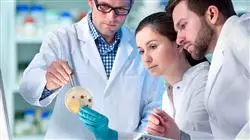
University certificate
The world's largest faculty of medicine”
Description
This professional master’s degree will contribute to gaining the up-to-date knowledge you are looking for in a field that has made great scientific progress in recent years"

The creation of individualized diets according to the intestinal microbiota of each person, the nutritional adaptation of pregnant women in favor of the microbiota of their babies and the approach to patients with diabetes or Parkinson's disease are just some of the scientific studies that have achieved important advances in this area. This research has given a boost to this specialty and requires medical professionals to constantly update their knowledge.
This professional master’s degree provides professionals with the opportunity to update their knowledge in this area with the help of a team of professionals specialized in this field and with extensive experience in the field of research and patient management based on their microbiota. A program, taught exclusively online, that will allow you to delve into the factors that influence the balance and imbalance of the microbiota, the intestinal and oral microbiota, as well as its relationship with the newborn, the immune system and the application of prebiotics and probiotics in medical specialties such as Urology, Gynecology, Gastroenterology and Immunology. All this, with a library of multimedia resources that can be accessed 24 hours a day from an electronic device.
TECH offers an excellent opportunity to all medical professionals who wish to update their knowledge with a flexible university education. To study this program, all you need is a computer, tablet or cell phone with an internet connection to access the virtual platform, where the syllabus of this program is hosted. This content is also available, in its entirety, from the beginning of this professional master’s degree. This will allow you to distribute the workload according to your needs and to combine your work and/or personal responsibilities with an education that is at the forefront of academic education.
A university program with a theoretical-practical approach that will take you through the most recent studies on the benefits of maintaining a correct microbiota"
This professional master’s degree in Human Microbiota contains the most complete and updated scientific program on the market. The most important features of the program include:
- Clinical cases presented by experts in Human Microbiota
- The graphic, schematic, and practical contents with which they are created provide scientific and practical information on the disciplines that are essential for professional practice
- New diagnostic-therapeutic developments on evaluation, diagnosis, and intervention in problems or disorders related to Human Microbiota
- Practical exercises where the self-evaluation process can be carried out to improve learning
- An algorithm-based interactive learning system for decision-making in the clinical situations presented throughout the course
- With special emphasis on evidence-based medicine and research methodologies in Human Microbiota
- All of this will be complemented by theoretical lessons, questions to the expert, debate forums on controversial topics, and individual reflection assignments
- Content that is available from any fixed or portable device with an Internet connection
A program with which you can delve into the approach to the different intestinal infections caused by viruses, bacteria, parasites and fungi modulating the altered intestinal microbiota"
The program's teaching staff includes professionals from the sector who contribute the experience of their work to this program, as well as renowned specialists from reference societies and prestigious universities.
The multimedia content, developed with the latest educational technology, will provide the professional with situated and contextual learning, i.e., a simulated environment that will provide immersive learning programmed to train in real situations.
This program is designed around Problem-Based Learning, whereby the professional must try to solve the different professional practice situations that arise throughout the program. For this purpose, the student will be assisted by an innovative interactive video system created by renowned and experienced experts.
An academic option designed for professionals seeking to recycle their knowledge in the field of microbiota with the support of an outstanding teaching team"

Reduce the long hours of study thanks to the Relearning system used by TECH in all its university programs"
Objectives
At the end of the 12 months of this program, the medical professional will have acquired an in-depth knowledge of the most recent advances in the field of Human Microbiota, allowing them to recycle their knowledge in this field. A renewal that will be possible thanks to the teaching team that makes up this program and that will accompany you throughout this professional master’s degree so that you can achieve your goals with agility and simplicity.

TECH provides you with a quality and flexible education, so that you can combine it with your professional responsibilities"
General Objectives
- Offer a complete and broad vision of the current situation in the area of the Human Microbiota, in its widest sense, the importance of the balance of this microbiota as a direct effect on our health, with the multiple factors that influence it positively and negatively
- Argue with the backing of scientific evidence how the microbiota is in a privileged position based on its interaction with many non-digestive pathologies, those of autoimmune nature or its relationship with immune system dysregulation, disease prevention and as a support to other medical treatments
- Promote work strategies based on the integral approach of the patient as a reference model, not only focusing on the symptomatology of the specific pathology, but also looking at its interaction with the microbiota and how it may be influencing it
- Encourage professional stimulation through continued specialization and research
Specific Objectives
Module 1. Microbiota. Microbiome. Metagenomics
- Update and clarify general and key terms for a full understanding of the subject such as microbiome, metagenomics, microbiota, symbiosis, dysbiosis
- Deepen knowledge of how drugs designed for humans can have a negative impact on the gut microbiota, in addition to the known impact of antibiotics
Module 2. Gut Microbiota I. Intestinal Homeostasis
- Study the microbial communities that coexist in symbiosis with humans, learning more about their structure and functions, and how these communities can be altered due to factors such as diet, lifestyle, etc.
- Understand the relationship between intestinal pathologies: SIBO, irritable bowel syndrome (IBS), Crohn’s disease... etc. and intestinal dysbiosis
Module 3. Gut Microbiota II. Intestinal Dysbiosis
- Delve into the knowledge of the Intestinal Microbiota as the main axis of the Human Microbiota and its interrelation with the rest of the body, its study methods, and its applications in clinical practice to maintain a good state of health
- Learn how to manage the different intestinal infections caused by viruses, bacteria, parasites, fungi affecting the intestinal microbiota
Module 4. Microbiota in Neonatology and Pediatrics
- Gain in-depth knowledge of the most influential factors of the intestinal microbiota of the mother, both in childbirth and in the gestation period itself
- Know the clinical applications of probiotics and prebiotics in the pediatric patient
Module 5. Oral Microbiota and Respiratory Tract
- Study the mechanisms by virtue of which probiotics are positioned as preventive in the formation of dental caries and periodontal diseases
- Acquire an in-depth knowledge of all the oral and respiratory structure and the ecosystems that live in them, seeing how an alteration of these ecosystems has a direct relationship with many associated pathologies
Module 6. Microbiota and Immune System
- Delve into the bidirectional relationship between microbiota and the neuroimmunological system and study in depth the intestine-microbiota-brain axis and all the pathologies that are generated in its imbalance
- Analyze the role of nutrition and lifestyle and their interaction with the immune system and the microbiota
Module 7. Skin Microbiota
- Studies factors that regulate the type of bacterial flora in the skin
- Know the methods for approaching triggered skin diseases
Module 8. Genitourinary Tract Microbiota
- Analyze the main microorganisms causing urinary infections and their relationship with the alteration of the microbiota in men and women
- Gain in-depth knowledge of how to use probiotics in the prevention of the main infections of the genitourinary tract
Module 9. Relationship between Intolerances/Allergies and Microbiota
- Know how a negative modulation in our microbiota can favor the appearance of food intolerances and allergies
- Gain in-depth knowledge of the changes in the microbiota in patients with food exclusion diets such as gluten
Module 10. Probiotics, Prebiotics, Microbiota, and Health
- Have a thorough knowledge of the safety profile of probiotics, since, although their use has become more widespread in recent years thanks to their proven efficacy, both for the treatment and prevention of certain diseases, this does not exempt them from generating adverse effects and potential risks
- Analyze the different clinical applications of probiotics and prebiotics in areas such as urology, gynecology, gastroenterology and immunology

You will get a deeper insight into the changes in the microbiota of patients on certain diets in a much more dynamic way thanks to the multimedia content"






